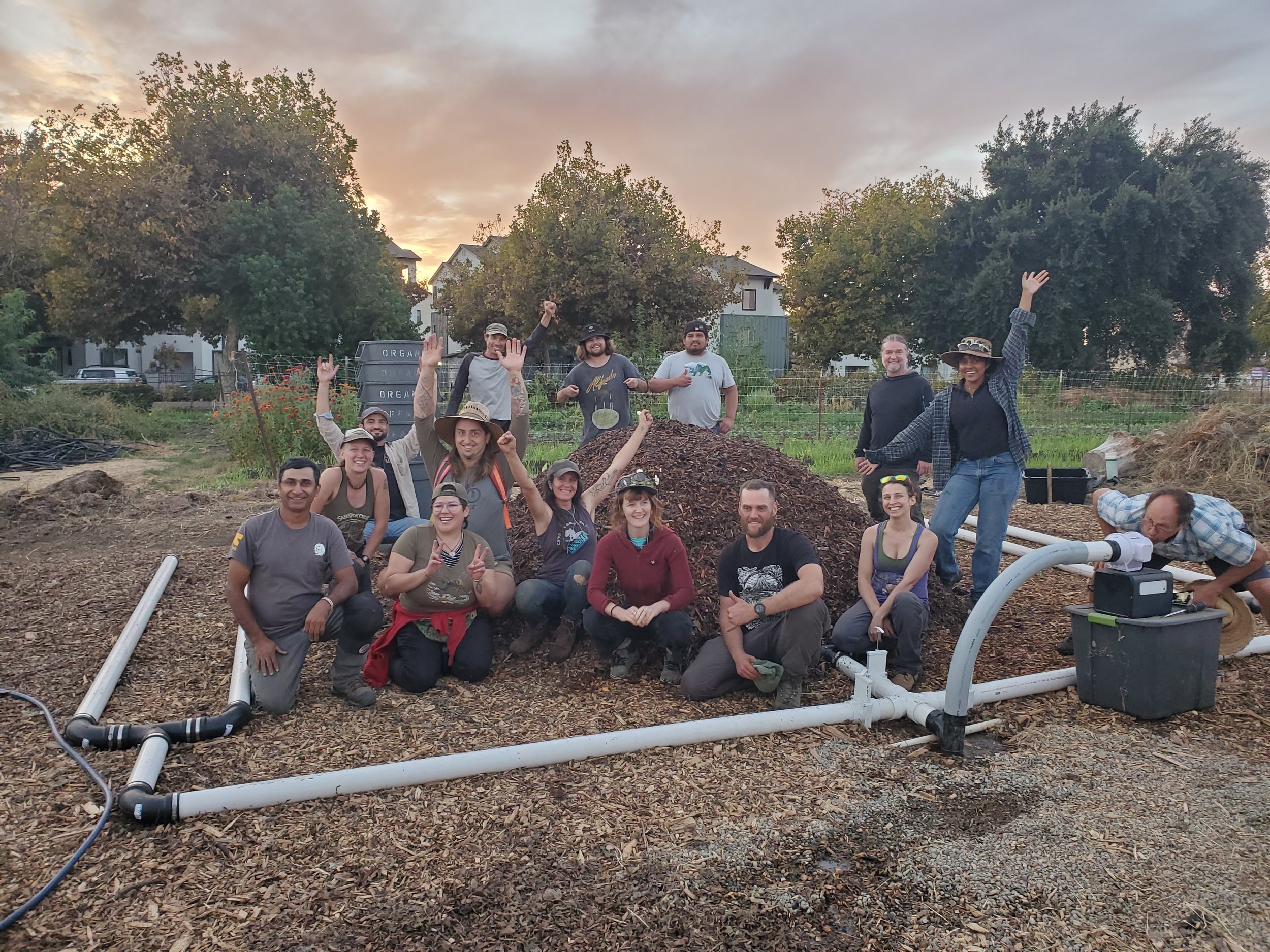California Department of Resources Recycling and Recovery’s (CalRecycle) Community Composting for Green Spaces Grant Program is funding community composting at hundreds of sites across California. In the first cycle of funding, the grant program awarded $1.5 million to the People, Food, and Land Foundation, which supported community composting at 117 sites throughout California, planted 488 trees, created 4,418 cubic yards of compost, and reduced emissions by 2,508 MTCO2e of GHG emissions. An additional $4.2 million was awarded to the California Alliance for Community Composting and LA Compost in the second cycle of the program. Through the establishment or expansion of community composting sites, communities receive benefits such as part time jobs and training on composting practices, fresh produce from adjacent gardens, training on farming practices, an increase in shade from tree planting, and the development of green spaces.
Improving Sacramento Valley Soil Health with Winter Cover Crop Species
In 2020, Sarah Light, agronomy advisor at the University of California Cooperative Extension, partnered with the Colusa County Resource Conservation District, Davis Ranch, Richter Ag, and the United States Department of Agriculture Natural Resource Conservation Service to apply for a CDFA Healthy Soils Program Demonstration Grant. The team received $99,832 of grant funding to conduct a demonstration project on cover crops on two fields in the Sacramento Valley from fall 2020 to spring 2024.
Hoopa Valley Tribe Brings Fire Back to the Land
In the Hoopa Valley Tribe’s homelands, California Climate Investments funding is helping the Hoopa Valley Tribe re‑introduce fire to an important oak woodland ecosystem. The work is supported by a $1.36 million grant from CAL FIRE’s Forest Health Program. The eastern side of the Hoopa Valley, on the current Hoopa Valley Reservation in what is known today as Humboldt County, has historically been home to extensive oak woodlands. Fire has always played an important role on this landscape—the people burned the hillsides for generations to maintain the oak trees and promote growth of other culturally important plants.
Improving Forest Health in the Yurok Community Forest and Salmon Sanctuary
Landscape-Scale Fuels Reduction and Forest Health in the Western Klamath Region
California Department of Forestry and Fire Protection
A $5 million CAL FIRE Forest Health Program grant is supporting the Western Klamath Restoration Partnership in their efforts to restore fire resilience at the landscape scale along the Klamath River. This project is part of a larger effort by the Western Klamath Restoration Partnership to improve forest health and resilience across a 1.2 million acre planning area that includes much of the Karuk Tribe’s ancestral homelands.
Advancing Ecological, Cultural, and Community Resilience with Tribal Nations in Southern California
With a $990,350 award from the Climate Change Research Program, the Resilient Restoration project – led by the Climate Science Alliance Tribal Working Group, University of California Riverside, and San Diego State University – is promoting Tribal resilience by developing knowledge and supporting actions that enhance persistence of cultural practices with a focus on preserving the ecosystems and species that are integral to Tribal communities.
Big Pine Paiute Tribe of the Owens Valley Community Transportation Needs Assessment
Using funds awarded by the Clean Mobility Options program, the Big Pine Paiute Tribe of the Owens Valley, a federally recognized California Native American Tribe, conducted a community-driven transportation needs assessment to determine the transportation needs and preferences of Big Pine Paiute’s residents. After the needs assessment is completed and approved by their Tribal Council, the Big Pine Paiute Tribe can use it to apply for additional funding from Clean Mobility Options or other transportation grant programs to implement clean mobility projects.
Pauma Band of Luiseño Indians Scales Up Carbon Farming
Tribal-Led Project Brings Affordable Housing and Sustainable Communities to Arcata
With the help of technical assistance providers funded by the California Strategic Growth Council’s California Climate Investments Technical Assistance program, Arcata 30th Street Commons became the first tribal led project funded by California Climate Investments through the Affordable Housing and Sustainable Communities program. The project, proposed by the Yurok Indian Housing Authority, earned a $11.4 million award and exemplifies how a strong vision, combined with partnership, technical assistance, and investment can help transform an under resourced community.
North Coast Resource Partnership Plans for Forest, Watershed, and Community Health
The North Coast Resource Partnership is a unique coalition of North Coast Tribes and seven counties that represent the North Coast and Klamath/Interior Coast Ranges ecological regions, both of which are important carbon storage areas in California. To help protect the health of forests in this territory, the North Coast Resource Partnership is using $4,037,500 of California Climate Investments funding through the Regional Forest and Fire Capacity Program to develop a regional priority plan that will generate implementation‑ready projects and provide funding for demonstration projects.













